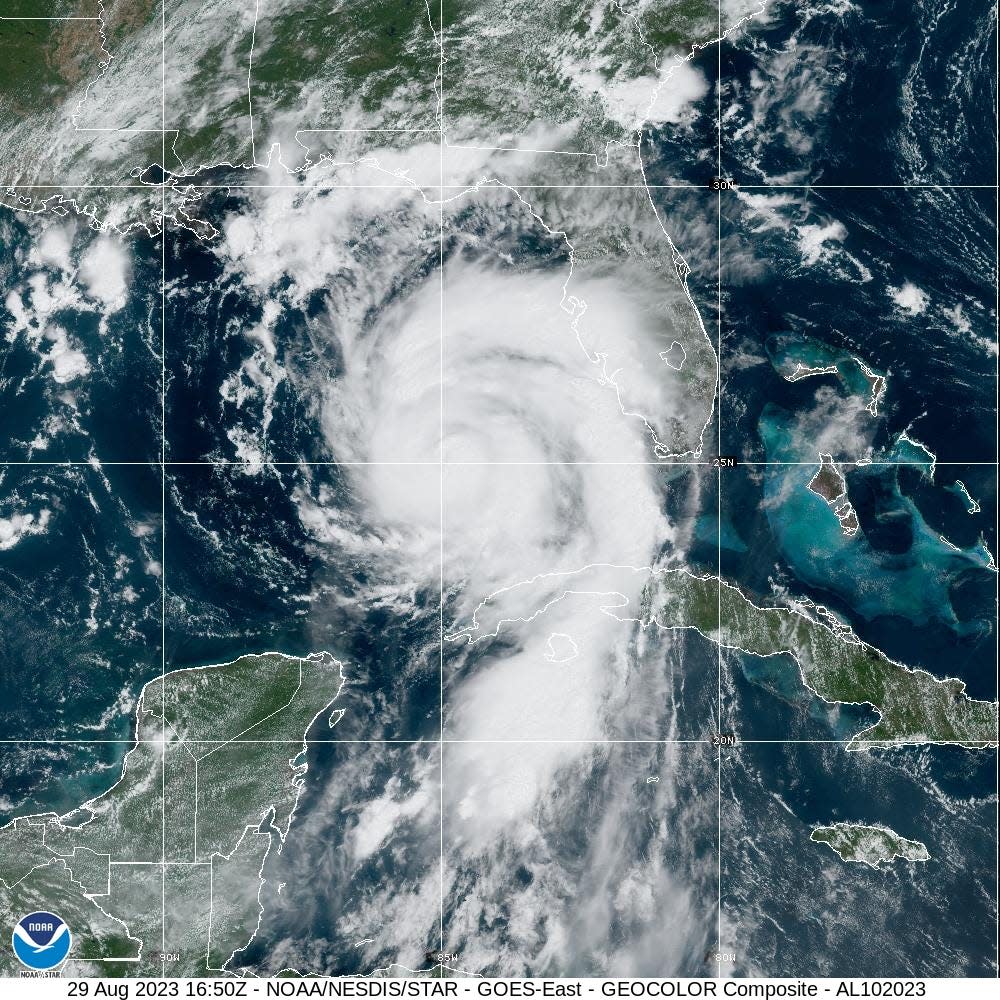Not again! Storm-weary Southwest Florida facing yet another potential trauma in Idalia

The post nailed Monday’s mood in three sentences.
“What's it called when people try to talk you out of your feelings?" Fort Myers Lab Theater Artistic Director Annette Trossbach asked on Facebook. “That storm is slow and huge and sitting in the warmest waters in recorded history. I don't think I can go through this again.”
And yet, here we were, bombarded by screamy headlines, sober advisories, states of emergency and serious traffic as Tropical Storm Idalia – or was is a hurricane already? – loomed somewhere out in the Gulf.
Cue the post-traumatic stress.
“AccuWeather Hurricane Experts Warn Major Hurricane Strike Looms for Florida as Idalia Set to Rapidly Strengthen Over Gulf,” “City, county offices close as evacuations are issued,” “Idalia roars to hurricane strength, takes aim at Florida's Gulf coast.”
More: Hurricane Idalia: Here is the latest news for Lee County and what to know
All this while many of us are still struggling after Ian: homes still broken, repairs unfinished, and just not ready for another one.
“I am not sure if it is PTSD, but it feels like angst and anxiety and helplessness all mixed together in a knot in my stomach,” is how Sanibel’s Becky Monroe describes it. “Before Ian, I only 'said' I knew a hurricane could hit my home… But now I know it can and I know just how horrible it can be.”
That’s the problem. We do know, in a way that’s still as fresh as it is awful. And as we contemplate what might be around the corner, the suspense is tough, Monroe says. "Deep down you want to believe something like Ian couldn’t happen again, so soon, but I also don’t think Mother Nature keeps score that way," she said. "The next 48 hours will be intense and the next 60 days will feel like forever. I just keep saying, ‘Please spare our island and our communities and give us some time to get our bearings again.’ "

She speaks for multitudes, says thoroughly credentialed Fort Myers mental health counselor Stacey Brown.
‘We all are traumatized by the storm that we had last year,” Brown said. “Everybody’s central nervous system is super jazzed.”
It's to be expected, Brown says. “It’s not a bad thing. It’s uncomfortable, but your body is doing what your body is supposed to do: It’s setting off the alarm that this could be dangerous, and because we have had a dangerous storm, we may be on hyper-alert (so) we can feel safe and protect ourselves. It’s part of the biological response.”
Or, as Amie Leigh says, "Pressures are high and hearts are racing and minds are flash-backing and tensions are rising as we see this storm off the coast."
Leigh should know. As clinical director of Capacity Path, which led the post-Ian mental health emergency response team in Lee County, she helped provide more than 8,000 crisis sessions.
While the question of whether the storm will actually hit us remains uncertain, our animal selves aren't taking any chances. "What we have to remember is that when our central nervous system is overly activated, our pre-frontal cortex is not online," Brown said.
In other words, she says, our thinking mind is out of the picture, "And we do stupid stuff, like yelling at people at the gas station and stuff like that."
Even if it's not that extreme, "our judgment might be off, we're going to be forgetful, cloudy, we forget our list going to the grocery store because our central nervous system just keeps us all a little ungrounded," Brown said. "And if there was trauma, that just heightens things and makes it worse (and) it's 10 times the magnification of just a scary storm."
This is where daily self-care, whether it's yoga, breathing or exercise, comes in handy, Brown says, "so we can handle things in a more grounded way maybe than those who don't do that."
Self-care routine or not, there are several things people can do as this storm approaches to help keep themselves on track, even if life around them isn’t, Brown says. Here are a few ideas
Face the facts: These are tough times
“Just remind yourself, ‘Yep, I’m activated. It is what it is, and I’m pretty jazzed right now.’ If everybody’s running around with their central nervous system’s ‘fight, flight or freeze’ response in place, you are going to not feel prepared; you’re going to be fighting with your spouse or (being agitated) at the gas station and just not in charge of yourself."
Keep your body in balance
“Make sure you’re eating protein, drinking water, make sure you’re moving your body,” Brown said. It's the put-on-your-own-oxygen-mask-first strategy. "It all helps you think as we are preparing for whatever might come."
More: Fort Myers Beach declares local emergency ahead of Hurricane Idalia; beach begins to flood
Shake it up, shake it off
Dogs do it, football players do it and you should too. “Something I’ve cued on the last several years is literally shaking your body, shaking yourself, jumping up and down. Taylor Swift knows what she’s talking about: Shake it off. Because when we shake, we regulate our central nervous system … And when you’re dealing with trauma, people are frozen in fear. Shaking can help reset that. It is an actual somatic technique that helps us.”
Just breathe. Oxygen helps
“Take huge deep breaths,” Brown says. “Buddha-belly breathing. The deeper we go, the more we soothe our vagal nerve response.” One caveat: “You can’t do a lot, because you’ll pass out, but you can do three, four, five of them. And really expand your lower belly, so you have to slow down and be with yourself.” Result? “That extra oxygen really helps you to regulate.”
A moment is all it takes
"This is a very hard time," Leigh said, "but if we practice having brief moments of respite - little islands and breaks of safety - whether it's for five seconds, 10 seconds, 30 seconds where we lean back (and) soften the chaos, close our eyes, step away for a moment, we settle it. Then we have the vitality to keep going and a little bit more resource within our own body to be helped and supported to get through this.?
Engage your senses for support
Essential oils like lavender and sandalwood, have been shown to help soothe. Or try playing some bilateral music on your earbuds, Brown says. "It will increase your ability to focus and pay attention, which is so needed during this time ... it is brain balancing so it really helps you to calm down as you're readying your home of pulling plant pots in closer to the home (and) helps transcend the anxiety."
Reach out to others who've been there
This has been key for Monroe. "My friends and neighbors are all pulling together like we did after Ian to support one another with words of comfort or jokes, whatever it takes to keep us going. The network of friendship we built after Ian is such a blessing. So few people can understand the myriad of emotions we have endured since Ian as well as in times like these: waiting for the next storm to pass."
More help is a phone call away
The federal Substance Abuse and Mental Health line 800-662-4357 can connect you with helpers who can assist with post-storm trauma. It's free, confidential and available 24 hours. Learn more: https://www.samhsa.gov/find-help/national-helpline
This article originally appeared on Fort Myers News-Press: Storm-weary Southwest Florida facing another potential trauma: Idalia

